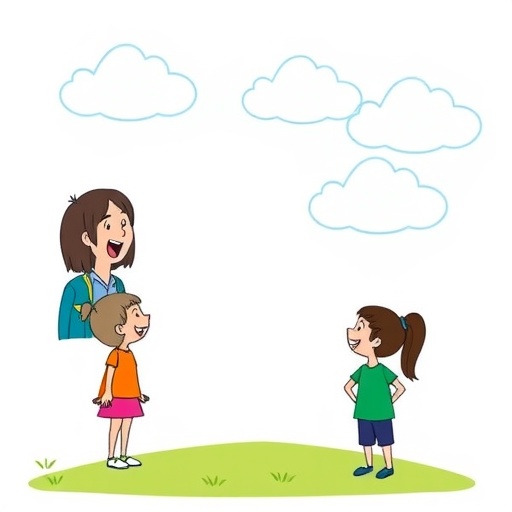In a groundbreaking study set to be published in the Early Childhood Education Journal, researchers Hernández-Torrano, Ibrayeva, and Sergazina delve into the often-overlooked perspectives of young children regarding their own happiness and well-being. The research shines a light on the critical concept that understanding children’s viewpoints is essential to enhancing their educational environments and overall quality of life. By prioritizing the voices of the youngest members of society, the study challenges educators, policymakers, and parents to rethink their approaches to early childhood education.
With a growing body of research emphasizing the importance of socio-emotional learning, this study arrives at a pivotal moment. The researchers engaged with children aged 4 to 6, utilizing a combination of interviews, drawings, and interactive activities to capture their insights about happiness. This qualitative approach allowed for a rich tapestry of emotions and values to surface, revealing that children’s happiness encompasses far more than mere academic achievement or material possessions. It encompasses relationships, play, freedom, and the ability to express oneself.
At the heart of this research is the assertion that fostering positive emotional development in young children is paramount for their lifelong mental health. The researchers reported that children articulated a desire for closer connections with their peers and adults, indicating that feelings of belonging and love significantly influence their happiness. Surprisingly, many children also identified simple pleasures—like playing in the park or spending time with family—as pivotal to their joy, suggesting that happiness may be more accessible than often believed.
Moreover, the study highlights the varied definitions of happiness. For some children, the joy came from tactile play experiences, while for others, happiness was about laughter and shared experiences. This diversity indicates that there is no one-size-fits-all approach to promoting children’s well-being in educational settings. It is crucial for educators to listen actively to children’s voices and tailor their approaches accordingly.
Another interesting finding presented in the research is the role of challenges and resilience in children’s understanding of happiness. Children’s comments indicated an awareness that difficulties are a part of life. Far from underscoring a naiveté, this insight reveals that children possess an innate resilience that enables them to navigate their emotions. This intrinsic strength serves as a reminder to adults that teaching coping skills and resilience in the face of adversity is also a vital part of nurturing children’s well-being.
The researchers advocate for inclusive conversations with children regarding their emotional experiences. They encourage educators to create environments where children feel safe expressing themselves and discussing their feelings. Parental involvement is equally essential; parents can engage their children in conversations about their daily experiences and emotions, giving them tools to understand and articulate their needs better.
Furthermore, the study points to the connection between happiness and play. Children conveyed that structured playtime was an essential component of their daily lives, influencing not only their happiness but also their learning outcomes. When children are allowed to explore and experiment through play, they develop critical skills such as creativity, problem-solving, and social interaction. The researchers assert that prioritizing play in early childhood education curricula could yield substantial benefits for emotional and cognitive development.
As the landscape of education continues to evolve, the researchers emphasize the importance of moving beyond standardized testing and academic performance metrics. Instead, prioritizing emotional well-being should become a fundamental goal of early childhood educators. Programs that emphasize nurturing children’s emotional and social skills may ultimately turn out children who are not only academically competent but also emotionally resilient.
The findings will serve as a call-to-action for educators and policymakers alike, urging them to cultivate environments where children’s perspectives are valued and prioritized. By shifting the focus towards well-being, education systems can foster holistic development that prepares children not just for academic success but also for happy, fulfilling lives.
Concluding their research, the authors express hope that these insights will cultivate a greater awareness of the value of children’s voices in shaping educational practices. The perception of happiness and well-being among young children must be taken seriously; it is crucial for the long-term development of society as a whole. This research serves as a timely reminder that in striving for academic excellence, we should not overlook the emotional landscapes that shape children’s lives.
In summary, this study illustrates that happiness is a complex yet vital element of early childhood education. By listening to children and integrating their perspectives into educational approaches, society can create spaces that honor their emotional needs and facilitate their overall well-being. The study’s findings urge stakeholders to re-evaluate educational priorities, focusing on well-being as the foundation for a joyful childhood.
As we move forward, the challenge remains: how will educators and parents implement these findings in practice? The road to meaningful change may indeed require concerted efforts, collaboration, and an unwavering commitment to placing children’s voices at the forefront of education.
Subject of Research: Children’s perspectives on happiness and well-being in early childhood education.
Article Title: What Makes Young Children Happy? Exploring Well-Being Through Children’s Perspectives in Early Childhood Education.
Article References:
Hernández-Torrano, D., Ibrayeva, L., Sergazina, M. et al. What Makes Young Children Happy? Exploring Well-Being Through Children’s Perspectives in Early Childhood Education.
Early Childhood Educ J (2025). https://doi.org/10.1007/s10643-025-02081-9
Image Credits: AI Generated
DOI: https://doi.org/10.1007/s10643-025-02081-9
Keywords: children, happiness, well-being, early childhood education, emotional development, play, resilience, social skills, educational practices.




